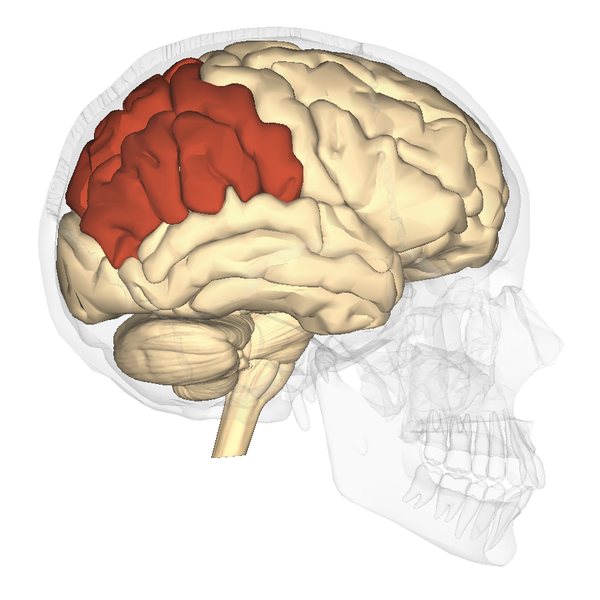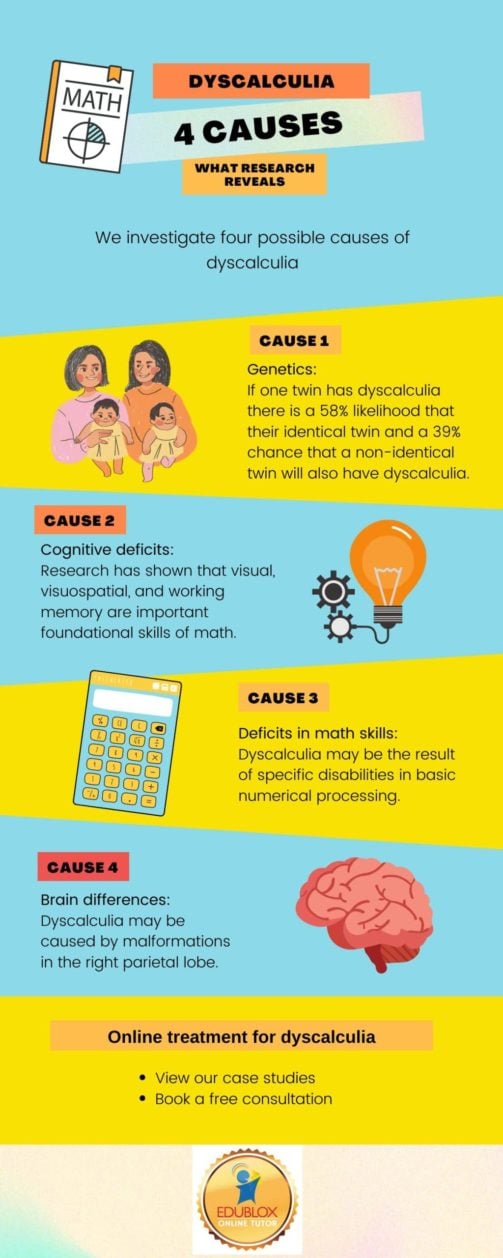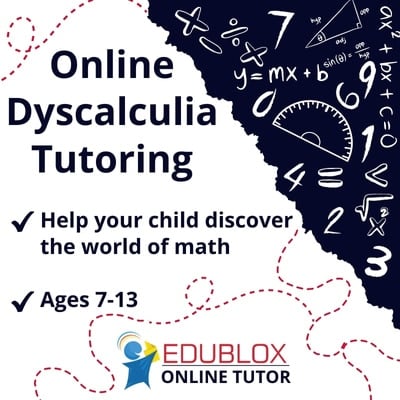The term dyscalculia — from the Greek ‘dys’ and Latin ‘calculia’ — means to count badly and describes people with severe difficulties with numbers.
Dyscalculia is a specific learning difficulty that hinders students from developing the basic number concepts needed to acquire mathematics.
We investigate four possible causes of dyscalculia: genetics, cognitive deficits, gaps in math skills and knowledge, and brain differences. After all, successful intervention depends on addressing a problem’s cause or causes.
Table of contents:
- Dyscalculia cause no. 1: Genetics
- Dyscalculia cause no. 2: Cognitive deficits
- Dyscalculia cause no. 3: Deficits in math skills
- Dyscalculia cause no. 4: Brain differences
- Key takeaways
Dyscalculia cause no. 1: Genetics

Dyscalculia is known to run in families, suggesting that genetic factors contribute to the risk of developing this learning disorder.
If one twin has dyscalculia, there is a 58% likelihood that their identical twin and a 39% chance that a non-identical twin will also be dyscalculic.
The link also exists between dyscalculics’ parents and siblings: around half of all the first-degree family members of a dyscalculic also have dyscalculia (mothers, 67%; fathers, 41%; brothers, 53%; sisters, 52%), and 43% of the second-degree relatives. This prevalence is around tenfold higher than expected for the general population. However, there are no gender differences (Kadosh & Walsh, 2007).
Dyscalculia cause no. 2: Cognitive deficits
Although some causes of dyscalculia have a genetic origin, and environmental factors play an important role, cognition mediates brain-behavior relationships. Therefore, it offers a sufficient level of explanation for developing interventions. Thus, we must understand the cognitive difficulties that underpin math failure, regardless of whether their origin is constitutional or environmental (Elliott & Grigorenko, 2014).
Research has shown that attention; visual and auditory processing; visual, visuospatial, working memory; and logical thinking are essential foundational math skills.
– Visual and auditory processing
Making comparisons of likeness and difference is nearly impossible for a person with processing (also called perceptual) deficits. For this reason, processing deficits frequently impact not only performance in reading but math as well.
Mercer and Pullen (2008) identified three primary problem areas in the perceptual field that affect performance in mathematics: figure-ground differentiation, discrimination, and spatial orientation.
- Figure-ground problems may cause difficulties in keeping individual problems separate from each other. For example, the student may lose his place on a worksheet, confuse problem numbers with digits in the problem itself, or not finish the problem.
- Visual discrimination problems tend to cause inversions in number recognition, confusion among coins, confusion among operation symbols, confusion between the hands of the clock, and the like.
- Auditory discrimination problems cause confusion in oral counting and among endings of number words, such as /fourteen/ and /forty/.
- Spatial problems may cause reversals and affect the ability to write problems horizontally or vertically, understand before-after concepts, understand the importance of directionality which, in turn, could affect regrouping, and align rows of numbers with varying digits. Additionally, the child may have problems putting decimals in the right place, using the number line, and understanding positive and negative integers. Also affected is the ability to tell time, to understand geometry, and any other mathematical concepts which have to do with spatial and temporal orientations and relationships.
– Visual memory
One hundred seventy-one children with a mean age of 10.08 years participated in a study by Kulp et al. (2001). This study was designed to determine whether or not performance on visual perception and memory tests could predict poor achievement in mathematics. Controls for age and verbal cognitive ability were included in all regression analyses because the failure to control for verbal ability has been a criticism of some literature investigating the relationship between visual and academic skills.
Kulp and colleagues concluded: “visual perceptual ability, and particularly visual memory, should be considered to be amongst the skills that are significantly related to mathematics achievement.”
– Visuospatial memory
Szűcs and team (2013) of the University of Cambridge, UK, set out to compare various potential theories of dyscalculia in more than a thousand 9-year-old children.
The researchers found that children with dyscalculia showed poor visuospatial memory performance. For example, they performed poorly when they had to remember the locations of items in a spatial grid. In addition, dyscalculic children’s ability to resist distraction from irrelevant information was also weak. For example, on a task where they had to choose which of two animals was larger in real life, they performed poorly when the real-life larger animal was smaller in its display size.
The findings challenge the notion that dyscalculia is characterized by problems with a specialized ‘number sense’ because this number sense was intact in this sample of children with dyscalculia.
– Working memory
Several studies have shown that children with mathematical difficulties underperform on tests of various aspects of working memory. In contrast, others found no differences between children with dyscalculia and typically developing children on working memory measures (Price & Ansari, 2013).
Dyscalculia cause no. 3: Deficits in math skills
Landerl et al. (2004) concluded that dyscalculia results from specific disabilities in basic numerical processing rather than deficits in cognitive abilities.
There are many things in mathematics that a student must learn to do, like, for example, the skills of counting, adding and subtracting, multiplication and division, applying place value and fractions, and reading time.
There is also much in math that one has to know and therefore has to learn, for example, many terms, definitions, symbols, theorems, and axioms. These are all things a student must know, not things that they must know how to do. For example, a child, who does not know what a sphere is, will have to guess when confronted by twelve objects and the question, “Which of the above objects has the same shape as a sphere?”
– How does math anxiety contribute to dyscalculia?
Mathematics anxiety (hereafter referred to as ‘math anxiety’) is an adverse reaction to math associated with negative emotions. Math anxiety is a feeling of tension, helplessness, mental disorganization, and dread produced when one is required to manipulate numbers or solve mathematical problems.
Reasons for math anxiety are usually classified as environmental, personal, or cognitive. Environmental causes can include negative experiences in math classes or with particular math teachers. Personal causes include low self-esteem, lack of confidence, and the influence of previous negative experiences with mathematics. Cognitive causes involve innate characteristics, such being either low intelligence or simply poor cognitive abilities in mathematics (Rubinsten & Tannock, 2010).
Math anxiety may influence students’ choices of courses in school and careers. Math anxiety can be specific: students may experience stress about particular math situations rather than all. On the other hand, math anxiety can be global: feel incompetent in all math situations and intensely dislike all aspects of mathematics. Extreme cases may lead to a phobia of mathematics and mathematical devices.
Math anxiety is distinguishable from other types of anxiety symptoms (i.e., math anxiety can exist in the absence of more general anxiety traits). It has a direct and deleterious effect on underlying cognitive processes as the individual performs a math task, especially for individuals with dyscalculia. They may experience intense fear, which may cause an inability to learn math concepts and skills or perform well on math tests (Rubinsten & Tannock, 2010).
Franklin (2018) says children with dyscalculia are more prone to math anxiety than other children. The catch-22 with math anxiety is that these children are less likely to engage in math-related activities and, therefore, fall farther behind their peers in math skill development. Falling behind exacerbates a child’s level of anxiety, which in turn diminishes their desire to engage in mathematics. And so it goes.
Dyscalculia cause no. 4: Brain differences

Kadosh et al. (2007) found strong evidence that dyscalculia is caused by malformations in the right parietal lobe.
Using neuronavigated transcranial magnetic stimulation (TMS) to stimulate the brain, the scientists brought about dyscalculia in typical people for a short time. They then completed a math task that involved comparing two digits, one larger in physical size than the other and the other larger numerically. For example, the subjects compared a 2 and a 4. However, the 2 was in a larger font than the 4 and the subjects had to decide which digit was numerically larger.
The effect of TMS lasted only a few hundred milliseconds in the subjects, and was brought on just at the point when the subject had to evaluate the numbers and decide which had the greater value or which was physically bigger. The test was designed to measure the subjects’ automatic processing of numbers and was rolled out to people with and without dyscalculia.
The researchers found that non-dyscalculic participants displayed dyscalculic-like behavior in number processing only during TMS-induced neuronal activity disruptions to the right intraparietal sulcus. These findings were further validated by testing participants suffering from developmental dyscalculia. The results of the dyscalculic group reproduced the behavioral results obtained in non-dyscalculic volunteers during right parietal TMS, but not after left parietal TMS or sham stimulation.
A study by McCaskey et al. (2020) concluded that dyscalculia is accompanied by reduced gray and white matter volumes in number-related brain areas.
It should be noted, however, that brain differences do not equal brain disorders (Protopapas & Parrila, 2018):
Differences in brains are certain to exist whenever differences in behavior exist, including differences in ability and performance. Therefore, findings of brain differences do not constitute evidence for abnormality; rather, they simply document the neural substrate of the behavioral differences.
It should also be noted that the brain is plastic. New connections can form, and the internal structure of the existing synapses can change. New neurons, also called nerve cells, are constantly being born, particularly in the learning and memory centers. Approximately 700 new neurons are daily being formed in the brain. Neurons die each day, too, keeping the overall number more or less balanced, with a slow loss of cells as we age (Spalding, 2015). A person who becomes an expert in a specific domain will have growth in the areas of the brain that are involved with their particular skill.
The human brain is a powerhouse. The human brain has put a man on the moon, created the silicon chip that can do billions of calculations per second, invented red, yellow, and green lights to control millions of people in traffic every day, and — believe it or not — found ways to see what goes on inside itself. The human brain itself tells us that it is most certainly capable of overcoming learning obstacles like dyscalculia, despite genetic influences and brain differences.
Edublox offers live online tutoring to students with dyscalculia. Our students are in the United States, Canada, Australia, and elsewhere. Book a free consultation to discuss your child’s math learning needs.
.
Key takeaways

Delve deeper
Dyscalculia statistics
There is no general agreement on the precise meaning of the term dyscalculia. Therefore, reports of dyscalculia’s prevalence vary depending on the definition and situation. Research suggests it has the same prevalence as dyslexia (about 6–8% of children), although it is far less widely recognized by parents and educators.
Dyscalculia characteristics, symptoms, and signs
The most generally agreed-upon feature of children with dyscalculia is difficulty learning and remembering arithmetic facts. The second feature of children with dyscalculia is difficulty executing calculation procedures, with immature problem-solving strategies, long solution times, and high error rates. There are many other characteristics, symptoms, and signs.
Dyscalculia types and subtypes
The term developmental dyscalculia is used to distinguish the problem in children and youth from similar problems experienced by adults after severe head injuries or as a result of a stroke. This type of dyscalculia is known as acquired dyscalculia. There are other types and several subtypes.
Dyscalculia treatment and intervention
We discuss the most important strategies that need to be applied to help a student overcome a math learning disability. We also look at the Edublox program that offers online help to students with mild to severe dyscalculia.
Authored by Susan du Plessis (B.A. Hons Psychology; B.D.), an educational specialist with 30+ years of experience in learning disabilities.
Medically reviewed by Dr. Zelda Strydom (MBChB).
.
Bibliography:
Ashcraft, M. H., & Faust, M. W. (1994). Mathematics anxiety and mental arithmetic performance: An exploratory investigation. Cognition Emotion 8, 97-125.
Hornigold, J. (2015). Dyscalculia pocketbook. Alresford, Hampshire: Teachers’ Pocketbooks.
Kere, J. (2014). The molecular genetics and neurobiology of developmental dyslexia as model of a complex phenotype. Biochemical and Biophysical Research Communications, 452(2), 236-243.
Levy L. M., Reis I. L., & Grafman J. (1999). Metabolic abnormalities detected by 1H-MRS in dyscalculia and dysgraphia. Neurology, 53, 639-641.
Shalev, R. S. (2007). Prevalence of developmental dyscalculia. In D. B. Berch & M. M. M. Mazzocco (Eds.), Why is math so hard for some children? The nature and origins of mathematical learning difficulties and disabilities (pp. 49–60). Baltimore, MD: Paul H. Brooks Publishing Co.
Siegel, L. S., & Ryan, E. B. (1989). The development of working memory in normally achieving and subtypes of learning disabled children. Child Development, 60, 973–980.

